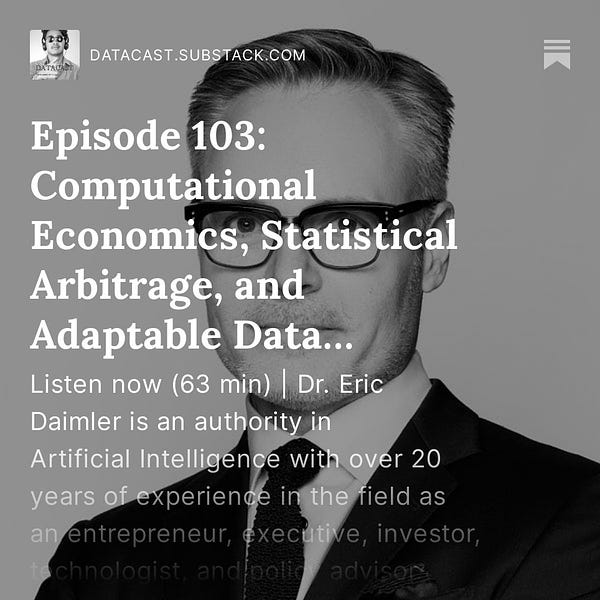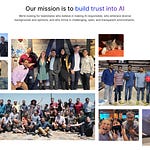The 103rd episode of Datacast is my conversation with Eric Daimler - an authority in Artificial Intelligence with over 20 years of experience in the field as an entrepreneur, executive, investor, technologist, and policy advisor. Eric has co-founded six technology companies that have done pioneering work in areas ranging from software systems to statistical arbitrage.
Our wide-ranging conversation touches on his academic experience at Carnegie Mellon University, his venture into tech investing during the dot-com boom, his research on Computational Economics, his journey in founding a statistical arbitrage hedge fund, his stint as a Presidential Innovation Fellow during the Obama Administration with a focus on AI and Robotics, his current journey with Conexus commercializing Category Theory, and much more.
Please enjoy my conversation with Eric!


Show Notes
(02:15) Eric reflected on his early interest in computer science and his decision to study at Carnegie Mellon University in the early 90s.
(05:40) Eric recalled his academic and overall college experience, emphasizing the importance of the people he was surrounded with.
(08:22) Eric talked about his time working as a quant analyst early in his career, the moment he encountered the birth of the Mosaic browser, and his decision to join the tech industry.
(13:01) Eric imparted wisdom learned from venture investing during the dot-com boom.
(18:02) Eric talked about the next phase of his academic career - earning a Ph.D. in Computer Science from Carnegie Mellon and dropping out of a Ph.D. program at Stanford.
(21:06) Eric discussed his academic research on Computational Economics for corporate malfeasance during his time as a Ph.D. student.
(27:39) Eric shared different initiatives he worked on with Carnegie Mellon University - serving as the Assistant Dean and Assistant Professor of Software Engineering, launching CMU's Silicon Valley Campus, and founding CMU's Entrepreneurial Management program.
(31:54) Eric described his journey in founding Hg Analytics, a hedge fund focused on statistical arbitrage, alongside other CMU's Computer Science PhDs.
(37:36) Eric revisited his passion for AI and robotics, which eventually led to serving as a Presidential Innovation Fellow during the Obama Administration with the White House Office of Science and Technology Policy.
(42:54) Eric shared his perspective on the role of AI in geopolitics and highlighted the challenges with data integration.
(47:29) Eric explained his company Conexus, which develops a technology spin-off from MIT's Mathematics department using a branch of math called Category Theory.
(50:55) Eric went over a customer case study that uses Conexus's solution to guarantee the semantics of data integrity during data transformation.
(54:20) Eric showed his enthusiasm for the concept of data relationships.
(56:59) Eric provided a sneak peek of his forthcoming book, "The Coming Composability: The roadmap for using technology to solve society's biggest problems."
(58:38) Closing segment.
Eric's Contact Info
Conexus' Resources
Mentioned Content
People
Book
"ReCulturing: Design Your Company Culture to Connect with Strategy and Purpose for Lasting Success" (by Melissa Daimler)
About the show
Datacast features long-form, in-depth conversations with practitioners and researchers in the data community to walk through their professional journeys and unpack the lessons learned along the way. I invite guests coming from a wide range of career paths — from scientists and analysts to founders and investors — to analyze the case for using data in the real world and extract their mental models (“the WHY and the HOW”) behind their pursuits. Hopefully, these conversations can serve as valuable tools for early-stage data professionals as they navigate their own careers in the exciting data universe.
Datacast is produced and edited by James Le. For inquiries about sponsoring the podcast, email khanhle.1013@gmail.com.
Subscribe by searching for Datacast wherever you get podcasts, or click one of the links below:
If you’re new, see the podcast homepage for the most recent episodes to listen to, or browse the full guest list.















Episode 103: Computational Economics, Statistical Arbitrage, and Adaptable Data Consolidation with Eric Daimler